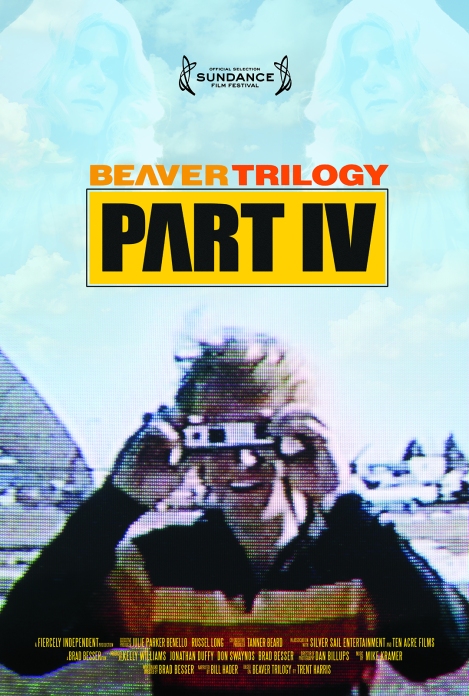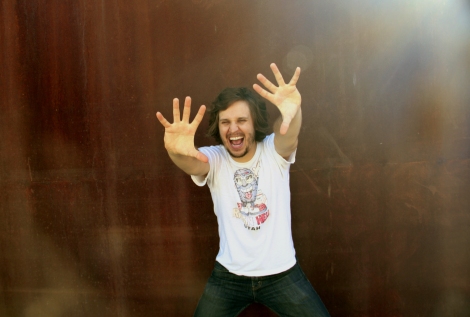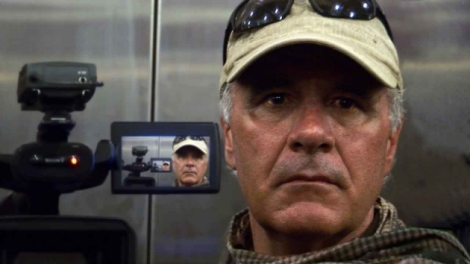
Brad Besser is a filmmaker, editor, and writer. His second feature-length documentary, Beaver Trilogy Part IV, had its World Premiere at the 2015 Sundance Film Festival to significant acclaim. The film tracks the history of fellow director Trent Harris’s underground classic, The Beaver Trilogy [2001], before coming to focus on Harris himself. Later in 2015, Living in the Age of Airplanes [2014, dir. Brian J. Terwiliger], on which Besser served as editor, will premiere at the Smithsonian Museum in Washington D.C.
Trent Harris is a filmmaker, visual artist, and educator. His independently distributed feature films, including Rubin and Ed [1991], Plan 10 from Outer Space [1995], Delightful Water Universe [2008], and Luna Mesa [2011] have led to his regard as an underground filmmaker and director of “cult classics.” His 2001 feature The Beaver Trilogy, composed of three short films compiled between 1979 and 1985, also had its World Premiere at the 2001 Sundance Film Festival to international praise. He and the Trilogy are the subjects of Besser’s Beaver Trilogy Part IV.
*****
Brad Besser and Trent Harris, in attendance at the 2015 Sundance Film Festival, spoke with Sean Malin of CineMalin: Film Commentary and Criticism about what it means to be called a cult filmmaker, making movies in beautiful Utah, and wrestling with the complicated legacy of The Beaver Trilogy. This interview has been transcribed, edited, and compressed from audio for publication.
*****
Sean Malin: I used to study experimental and underground films in college, both in and outside of my program at the University of California, Berkeley. If I remember correctly, and this was about 2011, people up there were circulating bootlegs of The Beaver Trilogy even at that time.
Trent Harris: Oh, yeah, I’m sure.
SM: That is to say, [Mr. Harris], that I have a history with your film as so many people – like Mr. Besser himself – also do. By this point, it’s safe to say that Beaver Trilogy has been around long enough to occupy a liminal space: it’s somewhere in between being a “cult” classic and a bonafide –
TH: Obscure classic!
SM: *Laughs* Right, or even just a classic-classic. This is happening with a lot of so-called cult films entering the mainstream, like Tommy Wiseau’s The Room [2003] or Troll 2 [1990, dir. Claudio Fragasso]. Now, with Beaver Trilogy Part IV premiering at Sundance and Bill Hader narrating it, the Beaver films stand to reach a wider audience than ever. What will that do to the legacy of the trilogy?
TH: At this point, I haven’t a clue what will happen. I just make them – and they either have lives of their own, or they don’t. There’s no way to “create” the kind of buzz needed to make something a cult film. It just happens or it doesn’t for many strange reasons. I think one of the reasons is that something is difficult to get a hold of and people can’t find it, so they start to really want it. Then it becomes a cult kind of thing when people pass around bootleg copies, etc.
SM: Like at that same time I was in Berkeley, people were passing around DVDs of Todd Haynes’s Superstar: The Karen Carpenter Story [1987].
TH: I’ve seen that and it’s a similar thing. But I honestly don’t know what will happen when I make these things; I just throw ‘em out into the world and wait and see.
SM: How does the trilogy’s legacy as a particular kind of film impact your own legacy in public discourse? You’re a filmmaker who’s found a lot of praise and success in underground filmmaking – so what would happen if your work was elevated to a more public sphere?
TH: It certainly wouldn’t bother me; I just don’t care. It’s so far beyond me and out of my control. Now, I do care about Brad’s film, but not how “they” categorize my movies. What I want is for Part IV to get a lot of attention.
Brad Besser: I went to school in Chicago, and The Beaver Trilogy was really big for me there, too. In Chicago, it played at a theater and I brought everybody I could to the screening.
SM: I know you and [Mr. Harris] have a previous relationship to this film. Was he at that screening?
BB: No, he wasn’t, the screening was really far South of the city. That didn’t stop me from bringing everyone I knew, though. I was like, “You guys have to see this.” Now I know for certain I’m not the only person to have had that experience *laughs*. I was a little bit afraid [before embarking on this project] because I was thinking, “How do you make a documentary about The Beaver Trilogy without ruining it?” What I found out was actually that you don’t make a documentary about The Beaver Trilogy: you make a film about the people who were in it, and the trilogy becomes an outlet for the viewer to get to Trent and the Beaver Kid’s [Richard “Dick” LaVon Smith, a.k.a. Groovin’ Gary] stories. That way The Beaver Trilogy can still live on as that cult classic.

SM: Didn’t you have access to Mr. Harris at a personal level – I believe he was your teacher at one point – long before you planned to make your film about him?
BB: Yes, but I remember far more about being in Trent’s class than Trent recalls about me even being in the class.
TH: *To Brad* I mean, you were only about twenty-years-old or something, right? And I’d been doing that class forever then. It’s long done now.
BB: By the time I took his class at the University of Utah, he had already been doing it for about fifteen years.
SM: Both of you make films that deal with your own self-placement into the arcs of the film, something that puts your movies into the lineage of Hitchcock, Michael Powell, and Werner Herzog. In film theory, that whole process is psychologized and given the term suture. But only you, [Mr. Besser], seem to have any kind of shame or guilt about it in Beaver Trilogy Part IV, whereas Mr. Harris has been putting himself in his audiovisual projects since the very beginning.
BB: I just didn’t want to be there too often.
SM: You only make one, brief appearance.
BB: I knew I was going to put something like [that appearance] in.
TH: For fun!
BB: *Laughs* It made it in there. And it is fun and strange. Even though I knew I wanted to put myself in there, I knew it couldn’t be too early or too often. There are hints throughout the film that I’m going to pop up –
SM: Absolutely there are. Your appearance is actually a punchline to an ongoing joke.
BB: Trent probably hints even more [to the viewer] that we’re there even more than we hint at it.
SM: Was your appearance in the film always supposed to be part of the story?
TH: I kept telling Brad that there wasn’t any story. I really did think that he was making a huge mistake.
SM: *Laughs* No…
TH: No, honestly – quite frankly, I’m not that interesting. The Beaver Trilogy is interesting, but to film me? I didn’t know what his angle on [his] film was, so I didn’t figure out what in the hell he was doing until I saw the rough cut. I just knew he kept showing up and he wouldn’t go away. And this went on for four years!

SM: Mr. Harris, you mention in the film that YouTube has started to open doors for people to get to your films like Plan 10 and Luna Mesa. Don’t you think that the democratization of access to your work has made you interesting to quite a large group of people? Maybe you’re not a B-level cult celebrity like Wiseau or the Troll 2 guys yet, but it could happen.
TH: *Gasps* You mean I might be able to work my way up to B-level? *Laughs* I have no idea what can happen with these films, like I’ve said. I did just finish shooting another movie though – this past Sunday [January 18, 2015] was the last day of filming. I just make the movies, I go about my life in Salt Lake City, I put them out into the world and I have idea where they will go. I don’t think too much about what’s beyond making the movie; and quite frankly, I don’t have much of a sense at all about being a “cult director.” That kind of status just doesn’t play into my mind. I like to make movies because it’s fun.
BB: Personally, I hope Part IV does bring people to Trent’s work. I agree that if the film had come out just like it has but without the trilogy as its anchor point, it could have gotten a little…lost.
TH: Oh, yeah. That was a brilliant choice, I think.
SM: How long was Beaver Trilogy Part IV in-the-making?
BB: This was kind of a weekend movie for a long time: shoot for a weekend, then we’ll figure the next part out, shoot again, then we’ll figure it out, and so on. But Trent’s been doing this kind of work for forty years. *To Trent* And it’s not just that you’ve been “making movies” all these years, but you have made movies like Rubin and Ed and Plan 10. I mean, Rubin and Ed remains a great film. Plan 10 is still a great film, too. You look at The Book of Mormon’s first scene and then you look at Plan 10 from Outer Space, and they are saying the exact same thing. Even some of your work with “Extra” [a Utah-based news program] is still great to watch. *To Sean* I also had a bootleg of Rubin and Ed when I was in school –
SM: Where did you get the video?
BB: A kid I knew in school gave it to me. So on my shelf of VHS tapes I had Rubin and Ed, Dumb and Dumber [1994, dirs. Peter and Bobby Farrelly], and a bootleg of Happy Gilmore [1996, dir. Dennis Dugan]. At the time, I had no concept of “This movie here is a big success and this one is a huge failure”; in my mind, the guy that had made Rubin and Ed must have been a big Hollywood director. So I figured, “Why not try and be like him?” And in a way, I’m still taking that idea with me because his body of work is so great.
SM: You two met in Utah and a big portion of both your work was filmed in the state. Having been to this festival a few times and to other parts of Utah for personal travel, there’s such a unique, magic aura to it. You both travel a lot for your work, too – there are even sequences of Mr. Harris walking in Europe and Southeast Asia in the film. How has geography impacted the work you’ve done together?
TH: I can’t really speak to [Beaver Trilogy Part IV] specifically, but I will say that Salt Lake City is an incredibly isolated place. There isn’t another major city within seven hundred miles of it. So what happens is you begin to build a very small, but very strong, community of people. Oddly enough, there’s a strong underground in Salt Lake – it may only be twenty people, but it’s vibrant and we all know one another. That isolation has worked for me and it’s why I still live in Salt Lake. Rents are cheap, there is not a whole hell-of-a-lot to do, so I work without much distraction.
BB: Growing up in Utah was a strange experience for me, mostly because of the religion. On the one side, there’s the conservative Mormon Church, and on the other, you’ve got the SLC punks, the Goths, the artists. In a way, because those groups are being pushed so far to one side in Utah, they are willing to try some things [artistically] that communities in other places might not try. There’s something there.
SM: Do you consider Part IV a collaboration or a community effort?
TH: No, this is Brad’s film. He’s the brains behind it and I have to say that I was very surprised with what he came up with. He’s a good documentary filmmaker with many more movies ahead of him, I think.
SM: Mr. Harris, were you pleased with Mr. Besser’s work after all that?
TH: I think he did a terrific job. As for me, I just hope never to have anything more to do with The Beaver Trilogy. It’s been more than thirty years at this point and I’m just looking to move past it. In fact, the new film I’ve just completed is much closer to Rubin and Ed than to something like the trilogy.
BB: *To Trent* What if I had come up to you when we first started and said, “I want to make a documentary about The Beaver Trilogy”?
TH: *To Brad* If you had said that to me from the beginning, I would have thrown you out.


Pingback: Interview with Kelly Williams and Don Swaynos | CineMalin: Film Commentary and Criticism·